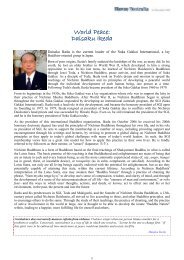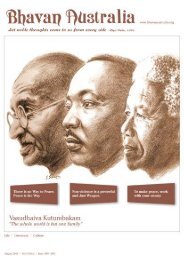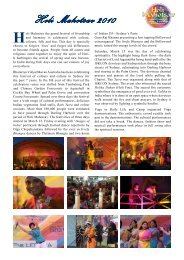The whole world is but one family - Bharatiya Vidya Bhavan Australia
The whole world is but one family - Bharatiya Vidya Bhavan Australia
The whole world is but one family - Bharatiya Vidya Bhavan Australia
You also want an ePaper? Increase the reach of your titles
YUMPU automatically turns print PDFs into web optimized ePapers that Google loves.
Member of the Constituent Assembly. <strong>The</strong><br />
Drafting Committee headed by Dr. B.R. Ambedkar<br />
was <strong>one</strong> of the important Committees of which<br />
Munshi was a member and he made invaluable<br />
contri<strong>but</strong>ions to its deliberations. I cannot <strong>but</strong> refer<br />
to the fact that the principle of guaranteeing to<br />
every person equal protection of the laws was<br />
the result of a draft written jointly by Munshi<br />
and Dr. Ambedkar. Munshi’s sense of equality<br />
did not confine itself to mere legal protection.<br />
He was a great champion of women’s rights to<br />
social, economic and legal equality. Aided by<br />
h<strong>is</strong> talented wife Lilavati Munshi, he carried on<br />
a crusade for ra<strong>is</strong>ing the status and dignity of<br />
women. <strong>The</strong> struggle for freedom directed itself<br />
not merely to shedding the foreign yoke <strong>but</strong> also<br />
towards emancipation of Harijans, women, labouragricultural<br />
and industrial. Every<strong>one</strong> of<br />
the oppressed section of the community found<br />
a glimmer of hope and joined the movement<br />
enthusiastically. And the women of India played a<br />
notable part in the national movement for freedom.<br />
<strong>The</strong> main thrust of Munshi’s work in the<br />
Constituent Assembly was, however, towards the<br />
making of a strong Centre. A student of the h<strong>is</strong>tory<br />
of the subcontinent that he was, Munshi knew that<br />
a weak Centre had always led to a weakening of<br />
the nation as a <strong>whole</strong>. Munshi saw the h<strong>is</strong>tory of<br />
India not as a record of dynasties or battles <strong>but</strong><br />
rather as a record of the progress of our people in<br />
time. He saw that period of strength, confidence<br />
and self-reliance alternated with periods of decline,<br />
weakness, subjugation and drift. He regarded 1947<br />
as an opportunity for India to begin an ascent once<br />
again. He believed that we had it in us to climb up<br />
into a new millennium. He wrote:<br />
“<strong>The</strong> Egypt of the Pharaohs, the Greece of Pericles,<br />
the Iran of Darius and the Rome of the Caesar are<br />
all dead; their life and culture, are mere materials<br />
for scholarly research. But India has stood the<br />
shocks of time. Manu, Buddha, Panini, Bhasa and<br />
Kautilya are still living influences operating on life;<br />
Sri Kr<strong>is</strong>hna’s exhortation to Arjuna still inspires the<br />
thought, hope and conduct of millions.”<br />
Munshi’s palpable devotion to the concept of a<br />
strong and unified motherland must definitely have<br />
weighed with the Government when it appointed<br />
him as Agent-General of the Government of India in<br />
Hyderabad. <strong>The</strong> Nizam’s province was trying hard<br />
to fly in the face of h<strong>is</strong>tory and become a Third<br />
Dominion. That step would have been not merely<br />
retrograde <strong>but</strong> d<strong>is</strong>astrous. Fortunately for us, our<br />
leadership did not allow personal ambitions to<br />
trifle with destiny in Hyderabad. If Sardar Patel<br />
32 | <strong>Bhavan</strong> <strong>Australia</strong> | February 2012<br />
was the architect of Hyderabad’s accession to<br />
India, Munshi was surely the engineer in the field.<br />
Acknowledging Munshi’s role, the Sardar wrote;<br />
“On behalf of the Government, I w<strong>is</strong>h to say that we<br />
are deeply conscious of the high sense of public<br />
duty that induced you to accept th<strong>is</strong> office and<br />
the very able manner in which you d<strong>is</strong>charged the<br />
duties entrusted to you which contri<strong>but</strong>ed in no<br />
small measure to the final result.<br />
“H<strong>is</strong> canvas was wide the<br />
paints on h<strong>is</strong> palette many.<br />
Culture, literature, the arts,<br />
legal <strong>is</strong>sues and politics<br />
continued to interest him.”<br />
Back in Delhi, Munshi was soon called upon to<br />
fill the seat in the Council of Min<strong>is</strong>ters vacated<br />
by Dr. Rajendra Prasad on h<strong>is</strong> election to the<br />
office of President. Munshi’s services as Union<br />
Min<strong>is</strong>ter for Food and Agriculture between 1950<br />
and 1952 saw him in yet another nation-building<br />
role. Munshi showed that a man with pride in the<br />
past could also have a faith in the future through<br />
the instruments of science and technology. It was<br />
Munshi who laid the foundations of a self-reliant<br />
agricultural economy, through an interlocking of<br />
agricultural research and extension. My friend Sri<br />
C. Subramaniam, who later heralded the Green<br />
Revolution, vouched for th<strong>is</strong>. Today when we<br />
are all so conscious of the environment and of<br />
ecological factors, it <strong>is</strong> instructive to note that as<br />
much as half century ago, as Union Agriculture<br />
Min<strong>is</strong>ter, Munshi said in a letter to Prime Min<strong>is</strong>ter<br />
Nehru:<br />
“I find that trees are being cut down thoughtlessly<br />
by the villagers and the process practically<br />
connived at by the authorities. (I w<strong>is</strong>h) ecological<br />
studies and the relation of our national ex<strong>is</strong>tence to<br />
our land, water, rivers and forests, <strong>is</strong> more closely<br />
studied.”<br />
<strong>The</strong> original impulse for preserving ecology came<br />
with Munshi’s Vanamahotsava scheme. <strong>The</strong><br />
Governorship of Uttar Pradesh, which Munshi held<br />
from 1952 to 1957, saw him establ<strong>is</strong>h the healthiest<br />
of conventions. Munshi’s relationship with the<br />
Council of Min<strong>is</strong>ters headed by Pant and later by<br />
Sampurnanand was, by any standards, exemplary.<br />
Respect was reciprocated by trust. <strong>The</strong> min<strong>is</strong>ters<br />
valued h<strong>is</strong> erudition and turned to him, as to an









